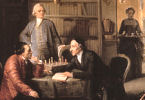


Winning starts with what you know
The new version 18 offers completely new possibilities for chess training and analysis: playing style analysis, search for strategic themes, access to 6 billion Lichess games, player preparation by matching Lichess games, download Chess.com games with built-in API, built-in cloud engine and much more.

A University of Utah study suggests that higher intellectual ability amongst the Ashkenazi Jews of central and northern Europe is the result of natural selection for enhanced intellectual ability. The study says the selective force was the restriction of Ashkenazim in medieval Europe for about 900 years to occupations that required more than usual mental agility. In describing what they see as the result of the Ashkenazic mutations, the researchers cite the fact that Ashkenazi Jews make up 3 percent of the American population but won 27 percent of its Nobel prizes, and account for more than half of world chess champions. They say that the reason for this unusual record may be that differences in Ashkenazic and northern European I.Q. are not large at the average but become more noticeable at the extremes; for people with an I.Q. over 140, the proportion is 4 per 1,000 among northern Europeans but 23 per 1,000 with Ashkenazim.

Prospect, launched in 1995, has a reputation as the most intelligent magazine of current affairs and cultural debate in Britain. Both challenging and entertaining, the magazine seeks to make complex ideas accessible and enjoyable by commissioning the best writers, editing them vigorously and packaging their work in a well designed and illustrated monthly.

The place of chess in European culture closely reflects the rise and fall of the educated elite, for whom it was the recreation of choice. The story begins with an image that records one of the great encounters of modernity: a group portrait, painted in 1856 by Moritz Daniel Oppenheim, which depicts three major figures of 18th-century thought—the dramatist Gotthold Ephraim Lessing, the Swiss divine Johann Caspar Lavater and the Jewish philosopher Moses Mendelssohn. The focus of the picture, around which these ornaments of the Enlightenment are stationed, is a chessboard.
The progress of chess from pastime to artistic or scientific maturity was accelerated by Jewish assimilation, which transformed the German-speaking Bildungsbürgertum, or educated middle class, of Mitteleuropa into agents of modernist reform. Chess is a special case of a more general phenomenon – the higher than average IQ of Ashkenazic Jews of European origin, which begs many questions and still defies simple explanation. We do not know whether Jews had an inherent disposition to excel at chess, or were attracted to the game because this intellectually demanding, competitive, sedentary sport fitted the prevailing Jewish stereotype in 19th-century Europe. What we do know is that what Gerald Abrahams identified as "the chess mind" – a combination of memory, logic and imagination – has much in common with skills that were and are characteristic of Jewish intellectual life.
What follows is a very readable cultural history of chess in Europe over the centuries. It culminates in the conclusion:
Once it was combined with that very English institution, the club, chess became one of the great socialising forces, an equaliser of class, race, sex and generation. It requires no infrastructure: just a few pieces of wood or plastic. So much has been owed by so many to chess that it can be seen as a microcosm of our endeavours, our constant companion through the ages. If all that were left of mankind were the game of chess, aliens would know us for what we are: not only Homo sapiens, but also Homo ludens.
Thanks to Ray Cheng of Virginia Beach, Va, and Frank Strzyzewski of Offenbach am Main, Germany, for sending us these links.
While it is not our policy to editorialise on news articles, as a Philosophy major with a background in evolutionary biology and ethology I cannot resist adding a few comments. The conclusions of University of Utah study seem dubious since no actual mechanism for the postulated "natural selection forces" is given. An evolutionary conclusion is being drawn, but natural selection always requires direct procreational advantages if distinctive traits are to emerge. Intellect is not a quality generally associated with this, at least not in civilised human society. In fact, if anything, it may be observed that intellectually talented individuals tend to have a smaller number of offspring than the average of the population.
On the other hand social environment and cultural heritage are orders of magnitude better at producing excellence in intellectual fields – like jumbo jets compared to continental drift. In our case we must assume that millions of chess talents go completely unnoticed simply because the individuals were not exposed to the game, or did not have a chance of receiving encouragement or proper lessons in their formative years. However, in an environment where chess (or music, science, mathematics) is vigorously pursued, a larger number of exceptional talents will be discovered. If the Ashkenazi population encouraged these activities for many generations, then that is where the explanation for the unusual excellence will most likely be found – not in the incredibly ponderous evolutionary process and with the biological mechanisms of selection and procreational advantage.
Frederic Friedel